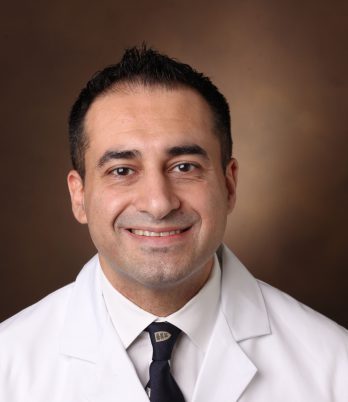People who have dealt with cancer may also need to take special care of their hearts. Here’s how.
People who have survived cancer, or are being treated for it, obviously hope to rid themselves of their illness, or at least manage it into submission. Unfortunately, some of the same powerful medications and radiation therapies that may beat back cancer can also take a toll on these patients’ hearts and blood vessels.
A new field of medicine, cardio-oncology, is growing, out of concern for cancer survivors’ heart health. Doctors specializing in cardio-oncology look for the best ways to treat people’s cancer, and the best ways to protect their hearts.
Vanderbilt cardio-oncology specialists have developed “the ABCDEs of heart health for cancer survivors.” Javid J. Moslehi, M.D., Director of Vanderbilt’s cardio-oncology program, explained that the “ABCDEs” is a checklist of things patients and their doctors should be aware of as they navigate the challenges of fighting cancer while protecting the heart and blood vessels. If you are being treated for cancer, or are one of more than 15 million Americans who is a cancer survivor, be sure to know these ABCDEs and talk through them with your doctors.
A is for awareness, assessment, aspirin and androgen deprivation therapy.
Doctors are increasingly aware that cancer treatment can cause cardiovascular problems. Be sure you are aware of signs and symptoms of heart disease, and the best way to assess and minimize your risk according to your health. Your doctor can guide you on this.
Some patients, especially those at risk of heart disease, may benefit from taking aspirin regularly. Talk to your doctor about whether you should use aspirin.
Androgen deprivation (or hormonal) therapy (also called ADT) is a common treatment for prostate cancer, but can increase the risk of heart disease in some patients. If you are being treated with ADT, discuss your heart disease risk with your doctor.
B is for blood pressure.
Blood pressure is an important gauge of cardiovascular health, whether someone has cancer or not. If you have increased blood pressure, or hypertension, you are at risk for heart disease. Controlling how much salt you consume, keeping your weight in a healthy range and possibly taking blood pressure medication are ways to control blood pressure.
C is for cholesterol, cigarettes and cardiac imaging.
Cholesterol levels in the blood are another indication of cardiovascular health. There are two types of cholesterol: high density lipoprotein, or HDL, cholesterol, the “good” cholesterol; and low density lipoprotein, or LDL, cholesterol, the “bad” kind. If you are being treated for cancer, your doctors should be monitoring your cholesterol levels. Too much cholesterol in the blood contributes to hardening or narrowing of the arteries.
Smoking cigarettes and using other tobacco products puts great strain on your heart and blood vessels. Quitting smoking is the best thing a smoker can do to improve his or her health, immediately — and if someone is dealing with cancer or already has heart disease, it’s especially important to break the cigarette habit. My Southern Health offers many tips on how to do this. Calling the TN Quitline at 1-800-QUIT-NOW is the best first step.
Cardiac imaging techniques (MR and PET scans) allow doctors to look at the heart for a better understanding of its health, both at the starting point of cancer treatment and later in life.
D is for diet, diabetes and dosing of chemotherapy/radiation.
The food you eat on a regular, long-term basis has a huge impact on your health. Routinely eating lots of vegetables and fruit and a balanced amount of lean protein, whole grains and a limited amount of fats is good for nearly anyone, but it’s especially important for people trying to safeguard their heart health.
Diabetes (having blood sugar, or “blood glucose” levels that are too high) is a major risk factor for heart disease. Talk with your doctor about checking your glucose levels while fasting. Diabetes and heart disease tend to go hand in hand, so preventing one is good for preventing the other.
In some cases, there can be heart damage from chemotherapy. Research has demonstrated that the dose of chemotherapy correlates with risk of heart disease. Especially if you have been treated with a class of chemotherapies called anthracyclines (also known as doxorubicin or Adriamycin), know the total dose of therapy you have received. A cardio-oncology team can determine the best type and dosing of chemotherapy to treat cancer but protect a patient’s heart as much as possible.
E is for exercise and echocardiogram.
Regular exercise is crucial for many aspects of our health, but it’s especially important for the heart and blood vessels. Regular physical activity (at least a total of 150 minutes of moderate aerobic exercise or 75 total minutes of vigorous aerobic exercise plus two strength-training sessions per week for most adults) ensures that your heart works efficiently and it helps keep your blood vessels clear of cholesterol buildup (which, in turn, helps control blood pressure). Exercise also burns calories, helping you to maintain a healthy weight, and helps control blood sugar.
An echocardiogram is an ultrasound scan of the heart. It uses sound waves to create a picture of the heart’s size and its components: chambers, valves and blood vessels. It’s a painless type of imaging, with no radiation, to help monitor heart health. Ask your doctor how often you should get an echocardiogram.
The ABCDE steps developed at the Vanderbilt cardio-oncology program are now being included into national guidelines for cancer patients. Interestingly, there is growing evidence that these ABCDE steps may help prevent cancer recurrence in addition to benefiting their heart, Moslehi said.

The Vanderbilt Cardio-Oncology Program brings together a team of doctors and researchers specializing in heart care and cancer, promoting and protecting the health of cancer patients hearts and blood vessels. Learn more here or call 615-322-2318.


